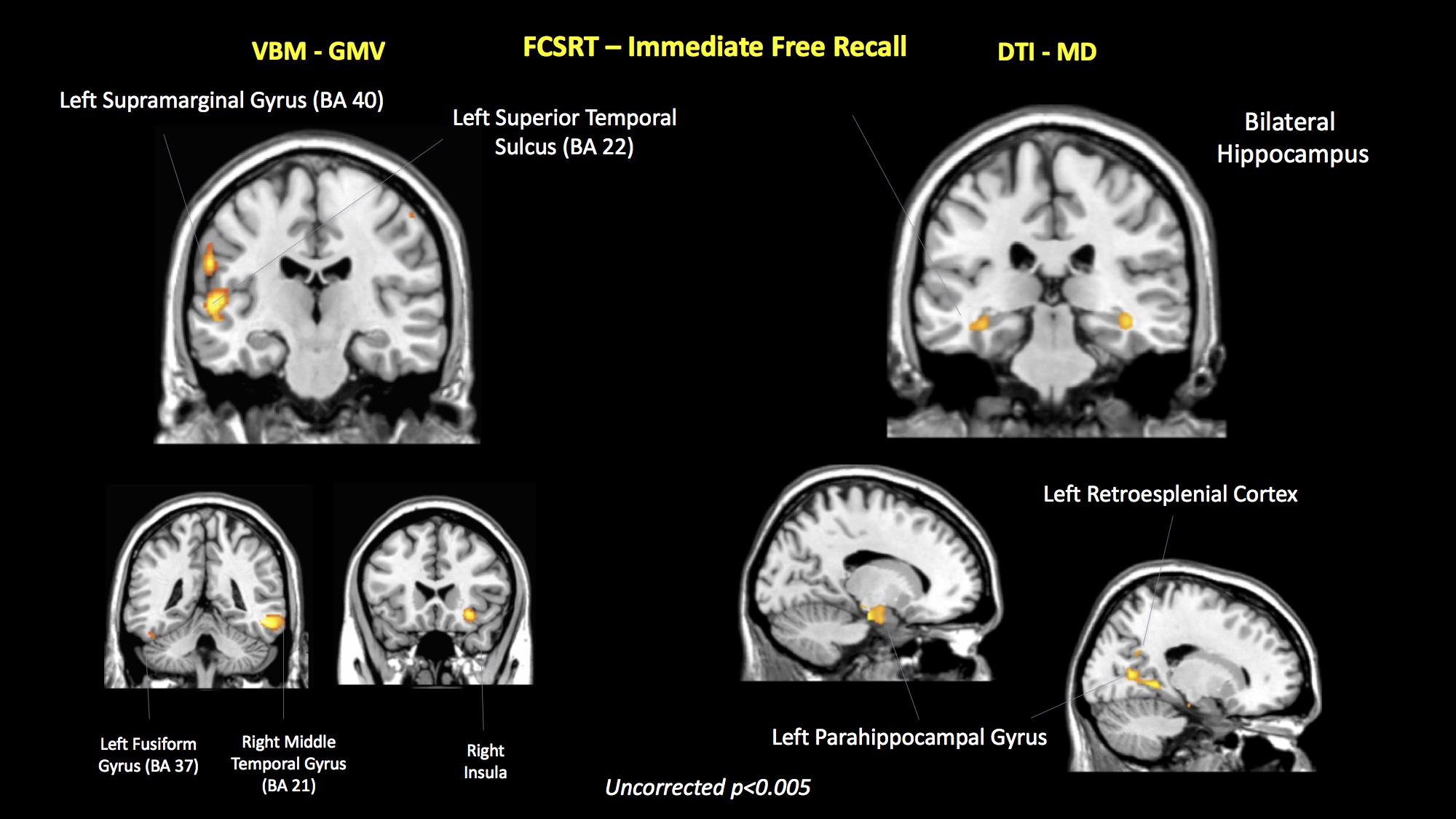Session Information
Date: Monday, October 8, 2018
Session Title: Parkinson's Disease: Cognition
Session Time: 1:15pm-2:45pm
Location: Hall 3FG
Objective: To assess the diagnostic accuracy of FCSRT for screening mild cognitive impairment in PD (PD-MCI), and to correlate FCSRT scores with gray and white matter structural changes.
Background: Buschke’s Free and Cued Selective Reminding Test (FCSRT) is an internationally accepted memory test with available normative data that has been shown to early screen cognitive impairment in elderly people (1), and to accurately predict progression to dementia in populations with amnestic mild cognitive impairment (2). In prodromic Alzheimer’s disease, FCSRT impairment correlates with hippocampal and parahippocampal atrophy. No studies assessing the accuracy of FCSRT for screening PD-MCI, or the neural correlates of FCSRT impairment in PD patients have been published.
Methods: Consecutive series of non-demented PD patients with (n=14) and without (n=24) PD-MCI according to Level II MDS-TF criteria, matched for age and educational level. Receiver Operating Characteristic (ROC) curve analysis was used to determine the optimal cutoff score of Immediate and Delayed Free and Cued Recall scores for screening PD-MCI. Gray matter volume (GMV) analysis from 3T-MRI T1-weighted images was carried out using voxel-based morphometry (VBM) analysis. DTI data were processed using FSL to obtain maps of mean diffusivity (MD) (p<0.005 uncorrected; k=50).
Results: In multivariate logistic regression analysis, FCSRT Immediate Free Recall (FCSRT-IFR) scores independently predicted PD-MCI (p=0.01). ROC curve showed that a cut-off score 22 on the FCSRT-IFR correctly classified 85% PD-MCI patients, with 78% sensitivity and 80% specificity (AUC 0.85; CI95% 0.79-0.91). VBM analysis showed FCST-IFR scores to correlate with decreased GMV in left supramarginal gyrus (BA40), bilateral superior temporal sulcus (BA22), right ventral temporal cortex (BA20), right middle temporal gyrus (BA21), and right anterior insula. DTI analysis showed FCST-IFR scores to correlate with decreased MD in bilateral hippocampus, left parahippocampal gyrus, and left retrosplenial cortex, involving structures that belong to the left parahippocampal cingulum bundle (CB-V), a white matter tract that connects the hippocampus and anteromedial temporal cortex with posterior temporal-parietal association areas.
Conclusions: 1. FCSRT Immediate Free Recall scores appears as an internationally validated neuropsychological test with high accuracy for screening PD-MCI. 2. Imaging results indicate that IFR-FCSRT scores may be a good marker of temporal and parietal neocortical degeneration.
References: 1. Grober E, Sanders AE, Hall C, Lipton RB. Free and cued selective reminding identifies very mild dementia in primary care. Alzheimer Dis Assoc Disord. 2010; 24: 284-90. 2. Sarazin M, Berr C, De Rotrou J, Fabrigoule C, Pasquier F, Legrain S, et al. Amnestic syndrome of the medial temporal type identifies prodromal AD: a longitudinal study. Neurology. 2007; 69: 1859-67.
To cite this abstract in AMA style:
J. Pagonabarraga, A. Horta-Barba, J. Marín-Lahoz, S. Martinez-Horta, H. Bejr-Kasem, I. Aracil, J. Pérez-Pérez, B. Pascual-Sedano, J. Kulisevsky. Diagnostic accuracy and imaging correlates of the Free and Cued Selective Reminding Test for screening mild cognitive impairment in Parkinson’s disease [abstract]. Mov Disord. 2018; 33 (suppl 2). https://www.mdsabstracts.org/abstract/diagnostic-accuracy-and-imaging-correlates-of-the-free-and-cued-selective-reminding-test-for-screening-mild-cognitive-impairment-in-parkinsons-disease/. Accessed December 25, 2025.« Back to 2018 International Congress
MDS Abstracts - https://www.mdsabstracts.org/abstract/diagnostic-accuracy-and-imaging-correlates-of-the-free-and-cued-selective-reminding-test-for-screening-mild-cognitive-impairment-in-parkinsons-disease/

